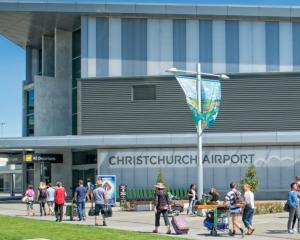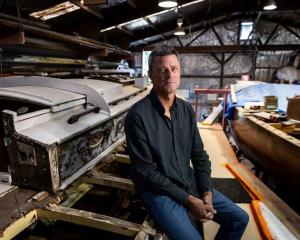
He has been in charge of keeping the lights on in Mid Canterbury as the chief executive of EA Networks, the locally owned cooperative operating the electricity distribution and fibre optic communications networks.
But now he's preparing to depart for new pastures, leaving behind a company he believes is well placed to handle challenges in the future.
“I’ve always enjoyed working in the energy sector, where we know what we do counts."
His enthusiasm for energy efficiency and decarbonisation is work he is set to continue in his new role, joining Deta Consulting.
Deta, a Christchurch-based firm, assists businesses across Australia and the Pacific to control energy use and reduce energy costs.
He will be replaced by Onno Mulder, who takes over in March.
Sutton started in the sector at what was Southpower in Christchurch in 1996, with the company becoming Orion in 1998.
He later became its chief executive in 2003, in charge of a company spanning the Rakaia River to the Waimakariri river.
Orion was bigger, while EA is more community focused, he said.
“At Orion, you were more remote from the real issues but here I’ve had to get involved in things like traffic management.

“It’s been more hands-on and working with a wide variety of people.”
He has often stepped out of the office to “get on the tools”.
“Not quite getting up a ladder but occasionally helped digging a ditch.
“I’m considered competent enough for that but not competent enough to climb the ladder.”
While being bigger, Orion still had the same challenge of keeping the lights on.
Then came the Canterbury earthquakes.
Sutton was chosen by the Government to be the first chief executive of the Canterbury Earthquake Recovery Authority (Cera) in 2011.
“That was a big change.
“The environment was so difficult. There was so much to do and working out how to prioritise what you did was so important.
“There was no template of what to do next.”
He had the mammoth task of steering the recovery plans, and looking back there were things he would do differently.
“All those vacant lots, I would have been much more deliberate and built cheap buildings quickly.
“The same way we built a temporary rugby stadium, we should have built temporary offices and accommodation that would have had the CBD populated.
“That way we would have had less development on the fringes of the city, which I think has dispersed the city in a way that isn’t good for the longer term.”
While there were things he knows he could have done better, “overall things went pretty well”.
Sutton resigned from Cera in 2014 after a staff member made a formal complaint about him. The high-profile investigation into the complaint made headlines at the time. Sutton moved on to become a Christchurch Anglican missioner, running the church's social services arm, which he said “was a good grounding for me".
He then took over as the head of EA Networks in 2020, replacing Gordon Guthrie who retired after 20 years as chief executive, and 44 years with the company.
The company is full of passionate people who regularly get out of bed in the worst of weather to fix faults and get people’s power back on, he said.
Compared to other rural regions, Sutton believes EA Networks is one of the best for ensuring minimal disruption.
The Ashburton District Council is the majority shareholder (95 per cent), and it is a company owned by its customers who want the lights to remain on, and if they do go out, they want information on when they will come back on, he said.
The changing world and a growing reliance on electronic devices means people are less tolerant of power outages, he said.
“People accept there are still going to be power cuts but they are going to be especially intolerant to long power cuts.
“You do need to go on your computer, charge your phone, and charge your car.”
Reliability is a key responsibility of a lines company and at EA Sutton feels that has continued to improve during his tenure - “through basically a lot of good work that was started long before I was here".
A large part of that is the work going into putting the power lines underground, and compared to other districts, Mid Canterbury is ahead of the game, he said.
“We are more than 90 per cent through the network.
“Some of that will take the next 10 years to do because it is work we do when we have the spare capacity.
“It costs a bit more, but it’s more reliable.”
EA Networks faces the same challenges any lines company does, he said.
“Trying to prepare the network for decarbonisation and loads converting to electricity, whether it be industrial loads using electric boiler or people buying electric vehicles.”
Looking to the future, the company will continue to play a key role in the district.
“Going forward, electricity is going to become even more important.
“It allows us to keep our phones going, run wifi, and those sorts of things but also as people transition to electric vehicles as well.”
The district has also had a lot of urban development, requiring new lines and connections to be installed.
“We have seen more growth in the last few years than we have seen for many years which is a positive sign.”
EA Networks is well placed to meet the growing demand, he believes.
“New Zealand needs to increase the output of its electricity by about 60 per cent over the next 25 years to meet the needs of electrifying transport and replacing coal and gas boilers around the country.
“We are going to need to connect a lot more renewable electricity and (Mid Canterbury) is in a better position than most other places to connect it because our network has been built big and strong for the irrigation loads.”
In simple terms, the network is five times bigger than a typical rural network, he said.
“If you want to go and build a solar or wind farm, it is much easier and cheaper to connect it at scale to this network than it is to almost any other rural network in the country.”
A large-scale solar farm is planned at Lauriston by Genesis Energy.
The 90-hectare site will hold approximately 80,000 solar panels with a capacity of 60MW and generate around 90GWh of renewable electricity annually - enough to power close to 13,000 houses.
“They haven’t started but are hoping to have it commissioned by Christmas next year.”
There is a need for more renewable energy sources, but it needs to be balanced by the fact that Mid Canterbury has good productive land.
Renewable energy sources need to be diverse and spread around the country, he said.
“If we all have solar on our rooftops, then how are we going to keep the lights on in Auckland on a cloudy day?
“We need to make sure they are distributed in places where it's sunny when it's cloudy in other parts - like on the West Coast when, on average if it's sunny there it isn’t raining in the hydro lakes.
“We need wind and solar which produce when it’s not raining in the hydro lakes.”
During his time with EA Networks, he has also worked with many of the big boiler owners in the district to help them decarbonise, including Ashburton Hospital and Ashburton College which are already in the process of decommissioning coal boiler systems.
He previously stated that shutting down the district's coal burners would reduce the same amount of emissions as all the vehicles in the district produce.
“We have had lots of discussions with all those big industrial users about how we can help them decarbonise and those have been good discussions.
“We feel we are more ready than most are to help them change.”
When it comes to decarbonisation, it’s sometimes better to seek big reductions than to seek zero, he said.
“We need to be rational about how we pursue climate change and we do things that make economic sense and don’t just do things that make us feel good.
“Sometimes five initiatives to reduce emission by 50 per cent are better than one that reduces by 100 per cent.”
The “political slogan” is often the enemy of achieving things with climate change, he said.
“Whether you believe climate change or not, there is a strong view that unless our producers are producing foods that are lower carbon, we in the longer term will have trouble selling our stuff into many markets.”
As he prepares to leave EA, he praises the people he's worked with.
“I’ve enjoyed being a part of the community, part of a business full of enthusiastic, passionate people who want to do the best for the community they live and work in.”
By Jonathan Leask
Local Democracy Reporter












